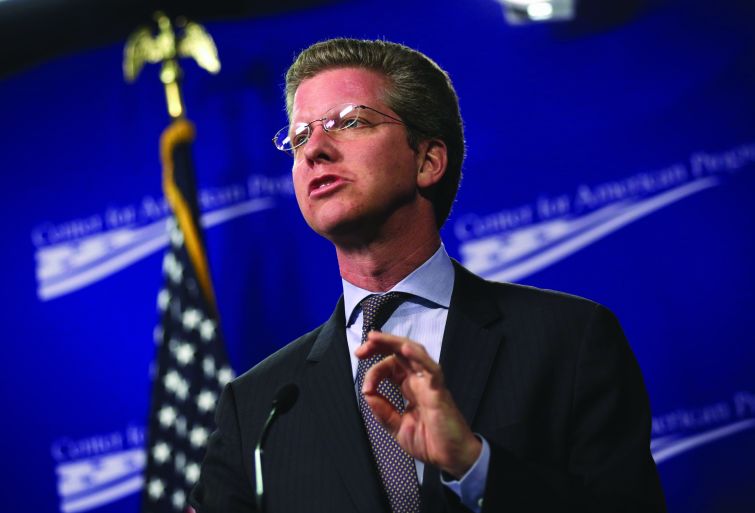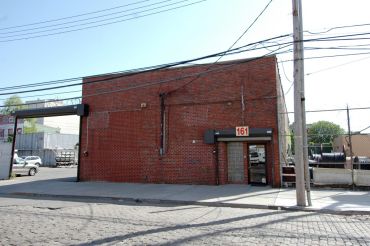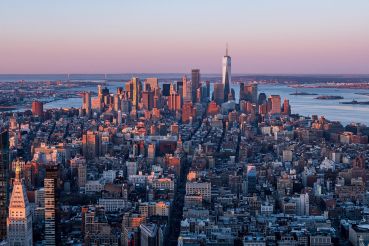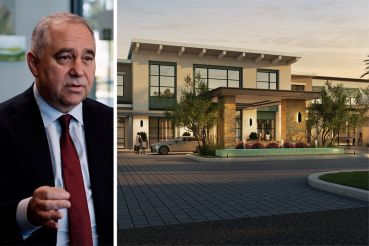The Race to Gracie Mansion: Interview With NYC Mayoral Candidate Shaun Donovan
The former HUD and HPD commissioner says he has plans to streamline NYC’s affordable housing approvals, overhaul its property tax system, and solve the homelessness crisis.
By Rebecca Baird-Remba March 12, 2021 12:19 pm
reprints
As the city faces its first competitive mayoral race since 2013, Commercial Observer has launched an interview series where we ask candidates about their positions on all things real estate, including zoning, property tax reform and affordable housing development.
For our first interview, we talked to Shaun Donovan. The 55-year-old Upper East Side native started his career at the National Coalition for the Homeless and the nonprofit Community Preservation Corporation, before serving as commissioner of New York City’s Department of Housing Preservation and Development for five years under former Mayor Michael Bloomberg. Donovan then spent another five years as secretary of the U.S. Department of Housing and Urban Development under former President Barack Obama, before heading the federal Office of Management and Budget until 2017.
This interview has been edited for clarity and length. (Listen to the audio of the interview below:)
Commercial Observer: How does your housing platform differ from the past eight years of Mayor de Blasio’s housing strategy?
Shaun Donovan: Well, I believe it begins with my deep, deep experience in housing. And, even more importantly, being someone who has, throughout my entire career, built partnerships with the private sector to get big things done. And, while I look forward to talking about many different aspects of the policies that I would bring that are different, I think the single, most important difference is that I would be a mayor for all New Yorkers.
I don’t see the private sector as inherently bad; I don’t see the need to demonize and divide New Yorkers. And I believe it has shown throughout my career that I can build partnerships between the public sector, nonprofits, community organizations, and private sector to get big things done, and to promote what I would call equitable growth — growth that benefits everyone.
And what neighborhoods would you rezone, if any? Currently, the city is trying to move forward with the rezoning of two wealthy neighborhoods, Gowanus and SoHo. So, this is kind of a big topic in the mayoral race.
Just stepping back, I think we need to encourage more affordable housing and the right kind of growth throughout the city. And, one of the ways that my platform is different is that I am proposing a comprehensive planning process that doesn’t just rely on rezonings to get housing built and to get more jobs in New York.
So, to be very specific: I am proposing that we create an inclusionary program that covers the whole city, and not one that would not be dependent on being imposed rezoning by rezoning by rezoning. I’m also proposing changes, such as accessory dwelling units, changes to parking requirements, and others that would ensure that we are encouraging more housing, more jobs across the city. As part of that, I would make sure that every neighborhood is taking its fair share of growth through a comprehensive planning process, and that we’re not concentrating it too much in Black and brown communities, low-income communities or any specific communities, but that it’s much more broadly shared. So I would start with that as a framework.
One other thing that I would include as well is, there are some arbitrary limits imposed by the state on density in some of our densest neighborhoods, where you can’t use the affordable housing inclusionary bonus, which goes up to 12 FAR [floor area ratio]. And that’s another change I think could be made citywide with the state’s help. So, those are all changes that I think are critically important.
Then, what I would say about rezoning, specifically: I think it’s very important that we engage communities in truly community-oriented planning earlier than we do currently. And a big part of the problem that has led to the failure of a range of rezonings around the city is that we communicate too late with communities; that we, essentially, have the city working out plans that are then shared too late in the process and lead to conflict and the inability to really drive the vision for building our neighborhoods with true partnerships with communities. And that’s something my whole career has been focused on, doing exactly that.
You mentioned a citywide inclusionary housing program. Comptroller Scott Stringer, another candidate, has a similar proposal. And there are concerns that it would essentially make all development discretionary. And that it could raise legal issues, that it could be construed as a taking, things of that nature. Do you think that there is a way to implement it, so that it won’t dramatically slow down new development?
Can you explain what you mean by ‘make all development discretionary’?
So, as it stands, you file your new building application with the Department of Buildings, right? And, as long as you conform to the current zoning, then you get the permit, essentially, once you go through the process. But, if we’re talking about a citywide inclusionary zoning policy, that assumes that each new residential building that gets built has to go through this process, with both [the Department of Buildings] and [Housing Preservation and Development] involved. And there’s some sort of decision made about, what area median income are we setting the affordable units at [and] how many affordable units. So, it’s more discretionary, right?
Yeah, I guess, I don’t want to get lost in a discussion of the fine points of the legal restrictions. But it’s really no different from when you rezone a specific part of the city and add inclusionary requirements. You can always change the zoning for a broader area, or even the entire city, in a way that doesn’t violate legal requirements, just as when you rezone a portion of the city. So, I’d have to understand more about the argument some people may be making, but I don’t see that there’s any legal issue around it. I think the critical point is designing the program in a way that it is effective.
And one of the things that I’m proposing as well is that we streamline and ensure that approvals move much more quickly than they currently do under Mayor de Blasio. I think it’s been a problem not just in housing, but in commercial development, small businesses. There are many ways in which the city — compared to where we were, when I was housing commissioner under Mayor Bloomberg — where approvals have slowed down; it’s become much more inefficient and costly for development.
Reforming the city’s property tax system has been a big priority of the City Council in recent years. And the mayor also created a property tax reform commission. So, would you push to reform the city’s property tax system, which has long been considered outdated by both owners and tenants?
I would, and I’ve been vocal about that. In fact, I was vocal when I was housing commissioner under Mayor Bloomberg, and did lead an effort to reform 421-a and improve it. I think there is no question that we could make our property tax system more efficient and more transparent, more consistent and predictable, and dramatically reduce the time and money that owners need to spend appealing valuations and arguing with the city. And I think that that would be a big benefit to everyone in the city.
Then, I think we also need to look at the system to balance what renters and homeowners in many parts of the state are currently paying. Really, our property tax system is the most regressive of all of our tax systems in the city. There are some who are focused on just raising property taxes, pied-a-terre taxes, and others. My focus is really on making the system simpler and more transparent, but also more equitable, so that we are not disproportionately putting the burden of property taxes on rental housing, particularly in the lowest income, Black and brown communities; and we’re undoing some of the really arbitrary differences between different forms of ownership, like co-ops, condos and single-family homes.
Many in the real estate industry believe the citywide hotel special permit will be a death knell for new hotel construction in New York City. Do you have a position on the special permit, which would effectively make all new hotel construction subject to City Council approval?
I do have concerns about it. I know that there is a current study going on of what the impacts would be, and I want to await that study and see more about what the actual impacts of the current proposal would be. But I do have significant concerns about potentially limiting the ability to get our tourism industry—especially at a time when it’s been so devastated by COVID—to get it back on its feet and thriving and growing again.
What steps would you take to address the city’s homelessness crisis? And I know you have a number of homeless-related things in your housing platform, but how would you grapple with the current shortage of shelter beds and many neighborhoods’ resistance to shelter construction and conversions?
So, this is very personal to me. I became a public servant because I grew up in New York City in the 1970s and ‘80s, saw homelessness exploding on our streets, and began working with the National Coalition for the Homeless after college, and have made ending homelessness a central focus of my career. And, in fact, under President Obama, I led the national strategy that dramatically reduced homelessness across the country. We cut street and family homelessness significantly, and we got the resources we needed from the Republican[-led] Congress. We ended veteran homelessness in more than 80 cities and states. So, I fundamentally believe that homelessness is a solvable problem, and I’m the only candidate in the race who really has a track record of solving it.
The way we do that is to change from the current focus, which has really been on shelters and hotels, to a housing-first approach. And that means, we need to be investing substantially more in supportive housing, which combines housing with the services and security, and all the other aspects that ensure not just that we end homelessness, that we get people on our streets back up on their feet [and] back into lives of purpose and meaning, but also that we keep communities safe.
We also need a much more coordinated system across all the different city agencies that ensures that people are not falling through the cracks. What I mean by that is, right now, if an individual is leaving the criminal justice system, leaving Rikers, is leaving the mental health wing at one of our public hospitals, they very often end up on our streets or in shelter. And it takes months, if not years, to place them into housing.
Instead, what we need is what’s called a coordinated entry system. I worked with cities across the country at the cutting edge of doing this. And we should have a system that allows us, every time someone leaves one of those institutional facilities, [that] they’re directed to the housing and services that they need, rather than falling through the cracks and falling into a spiral of homelessness.
OK. New York City has long struggled to finance and build enough housing for low-income New Yorkers. How would your housing strategy address that problem?
So, first, we need to ensure that we’re preserving the affordable housing we have that reaches the lowest-income New Yorkers. Public housing is the single, most precious, affordable housing resource we have. More people live in public housing in New York than live in Atlanta. So, a critical part of my housing strategy would be to ensure that we are saving public housing in the city. I’m the only candidate who is committed to investing $2 billion per year in public housing from city capital.
And I’m the only candidate who really has a comprehensive strategy to get to a total of $40 billion that we need to save public housing. I know we can do that, because I’ve done that in other places across the country. I’ve worked with mayors in San Francisco, and many other places where public housing was actually in worse condition than public housing in New York City, and given them the tools to be able to fundamentally revitalize housing. But, it also takes a mayor, who really knows how to manage, to roll up their sleeves, and get into the nuts and bolts of how to make government work better.
There’s no question that money alone won’t save public housing. We need to manage it much more effectively. Right now, if you’re a resident in public housing who has a leak in their shower, by the time the 15 people that would need to sign off, by the time they’ve signed off, that leak has now turned into mold that causes your child’s asthma, or has broken through the roof downstairs and become a much more extensive and impactful problem.
So, we need to move to a site-based management, where every resident knows that they can go downstairs to the office [and] look someone in the eye, who has the authority, the funding and the tools to actually get these problems fixed much more quickly.
One last question, a non-policy question. Where was your first New York City apartment? And what was it like?
My first New York City apartment, that I went home to when I was born at Mount Sinai Hospital, was on 72nd and Third Avenue.
So was it an old school like pre war two or three bedroom kind of thing?
I was the second of four kids in my family. And the apartment was definitely too small. And my parents had four kids in four and a half years. And so we were a quickly growing family. And it was a more modern building. It wasn’t a pre war. And it was definitely too small for the six of us. So pretty quickly, we moved out of there—I think it was a two bedroom—into a bigger apartment on 79th Street and York.


